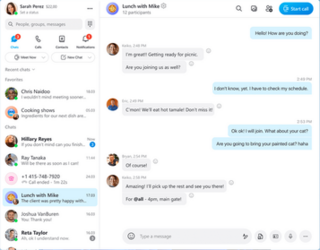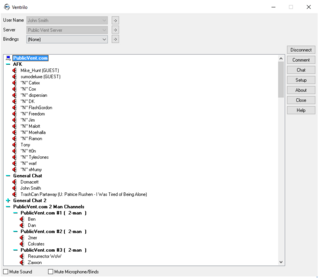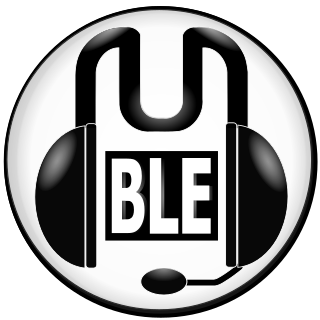Speex is an audio compression codec specifically tuned for the reproduction of human speech and also a free software speech codec that may be used on VoIP applications and podcasts. It is based on the CELP speech coding algorithm. Its creators claim Speex to be free of any patent restrictions and it is licensed under the revised (3-clause) BSD license. It may be used with the Ogg container format or directly transmitted over UDP/RTP. It may also be used with the FLV container format.

Extensible Messaging and Presence Protocol is an open communication protocol designed for instant messaging (IM), presence information, and contact list maintenance. Based on XML, it enables the near-real-time exchange of structured data between two or more network entities. Designed to be extensible, the protocol offers a multitude of applications beyond traditional IM in the broader realm of message-oriented middleware, including signalling for VoIP, video, file transfer, gaming and other uses.

VideoLAN is a non-profit organization which develops software for playing video and other media formats. It originally developed two programs for media streaming, VideoLAN Client (VLC) and VideoLAN Server (VLS), but most of the features of VLS have been incorporated into VLC, with the result renamed VLC media player.

NetWare is a discontinued computer network operating system developed by Novell, Inc. It initially used cooperative multitasking to run various services on a personal computer, using the IPX network protocol.

Skype is a proprietary telecommunications application operated by Skype Technologies, a division of Microsoft, best known for VoIP-based videotelephony, videoconferencing and voice calls. It also has instant messaging, file transfer, debit-based calls to landline and mobile telephones, and other features. Skype is available on various desktop, mobile, and video game console platforms.

Ventrilo is a proprietary VoIP software that includes text chat.
NX technology, commonly known as NX or NoMachine, is a remote access and remote control computer software, allowing remote desktop access and maintenance of computers. It is developed by the Luxembourg-based company NoMachine S.à r.l.. NoMachine is proprietary software and is free-of-charge for non-commercial use.

Google Talk was an instant messaging service that provided both text and voice communication. The instant messaging service was variously referred to colloquially as Gchat, Gtalk, or Gmessage among its users.

Microsoft NetMeeting is a discontinued VoIP and multi-point videoconferencing program offered by Microsoft. NetMeeting allows multiple clients to host and join a call that includes video and audio, text chat, application and desktop sharing, and file sharing. It was originally bundled with Internet Explorer 3 and then with Windows versions from Windows 95 to Windows Server 2003.

A VoIP phone or IP phone uses voice over IP technologies for placing and transmitting telephone calls over an IP network, such as the Internet. This is in contrast to a standard phone which uses the traditional public switched telephone network (PSTN).
Gizmo5 was a voice over IP communications network and a proprietary freeware soft phone for that network. On November 12, 2009, Google announced that it had acquired Gizmo5. On March 4, 2011, Google announced that the service would be discontinued as of April 3, 2011.

Roger Wilco is one of the first voice-over-IP client programs designed primarily for use with online multiplayer video games. Roger Wilco enabled online gamers to talk to one another through a computer headset or other audio input device instead of typing messages to each other. Within a year of the software's introduction, over 2 million online video gamers were using the application.
QuteCom was a free-software SIP-compliant VoIP client developed by the QuteCom community under the GPL-2.0-or-later license. It allows users to speak to other users of SIP-compliant VoIP software at no cost. It also allows users to call landlines and cell phones, send SMS and make video calls. None of these functions are tied to a particular provider, allowing users to choose among any SIP provider.
Internet Low Bitrate Codec (iLBC) is a royalty-free narrowband speech audio coding format and an open-source reference implementation (codec), developed by Global IP Solutions (GIPS) formerly Global IP Sound. It was formerly freeware with limitations on commercial use, but since 2011 it is available under a free software/open source license as a part of the open source WebRTC project. It is suitable for VoIP applications, streaming audio, archival and messaging. The algorithm is a version of block-independent linear predictive coding, with the choice of data frame lengths of 20 and 30 milliseconds. The encoded blocks have to be encapsulated in a suitable protocol for transport, usually the Real-time Transport Protocol (RTP).
This is a comparison of voice over IP (VoIP) software used to conduct telephone-like voice conversations across Internet Protocol (IP) based networks. For residential markets, voice over IP phone service is often cheaper than traditional public switched telephone network (PSTN) service and can remove geographic restrictions to telephone numbers, e.g., have a PSTN phone number in a New York area code ring in Tokyo.

Jitsi is a collection of free and open-source multiplatform voice (VoIP), video conferencing and instant messaging applications for the Web platform, Windows, Linux, macOS, iOS and Android. The Jitsi project began with the Jitsi Desktop. With the growth of WebRTC, the project team focus shifted to the Jitsi Videobridge for allowing web-based multi-party video calling. Later the team added Jitsi Meet, a full video conferencing application that includes web, Android, and iOS clients. Jitsi also operates meet.jit.si, a version of Jitsi Meet hosted by Jitsi for free community use. Other projects include: Jigasi, lib-jitsi-meet, Jidesha, and Jitsi.

Mumble is a voice over IP (VoIP) application primarily designed for use by gamers and is similar to programs such as TeamSpeak.

Jami is a SIP-compatible distributed peer-to-peer softphone and SIP-based instant messenger for Linux, Microsoft Windows, macOS, iOS, and Android. Jami was developed and maintained by the Canadian company Savoir-faire Linux, and with the help of a global community of users and contributors, Jami positions itself as a potential free Skype replacement.

Opus is a lossy audio coding format developed by the Xiph.Org Foundation and standardized by the Internet Engineering Task Force, designed to efficiently code speech and general audio in a single format, while remaining low-latency enough for real-time interactive communication and low-complexity enough for low-end embedded processors. Opus replaces both Vorbis and Speex for new applications, and several blind listening tests have ranked it higher-quality than any other standard audio format at any given bitrate until transparency is reached, including MP3, AAC, and HE-AAC.











